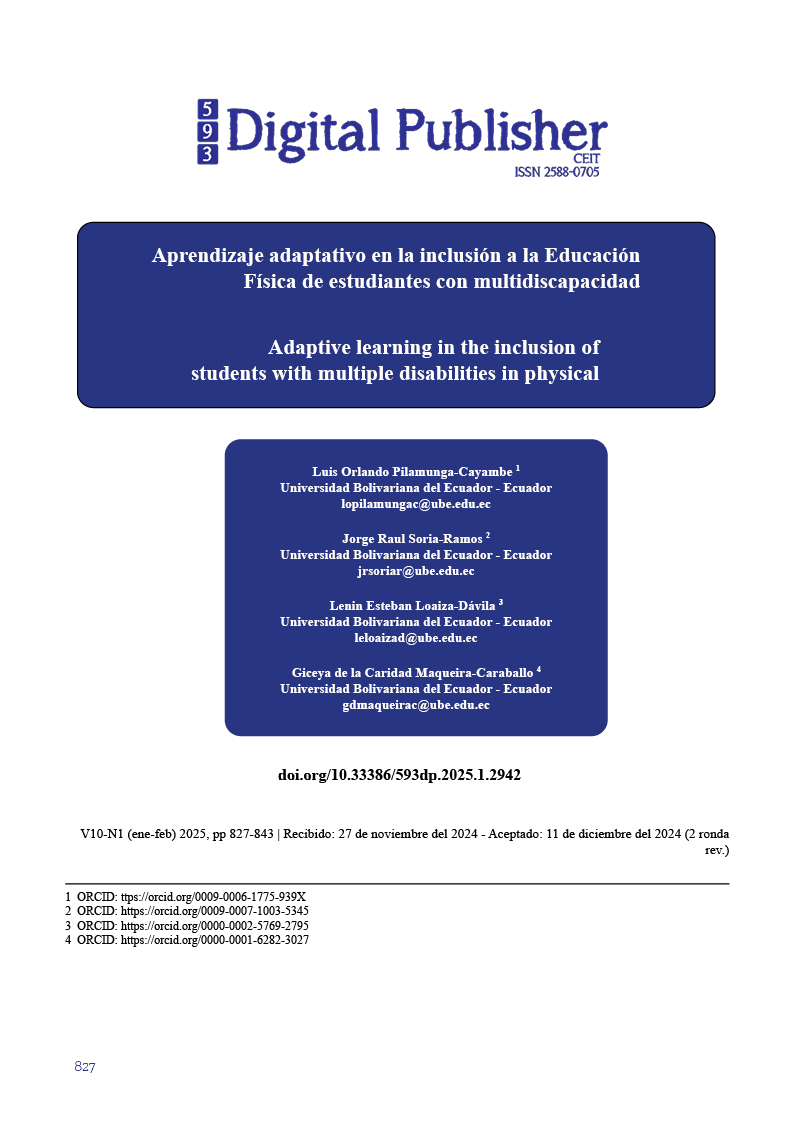Aprendizaje adaptativo en la inclusión a la Educación Física de estudiantes con multidiscapacidad
Contenido principal del artículo
Resumen
El estudio aborda el diseño de estrategias de aprendizaje adaptativo para la inclusión de estudiantes con multidiscapacidad en la Educación Física (EF), considerando sus necesidades específicas y las teorías fundamentales de la inclusión. Se utilizó un diseño cuantitativo preexperimental, aplicativo y de campo, con una muestra de 27 estudiantes de segundo año de Bachillerato General Unificado de un colegio del cantón Chambo, provincia de Chimborazo, Ecuador, incluyendo un estudiante con un diagnóstico específico de multidiscapacidad al 42% (16% de discapacidad física “Hemiplejia espástica” y un 28% de discapacidad intelectual “Retraso mental con un leve deterioro del comportamiento”). La intervención se centró en adaptaciones curriculares, metodológicas y de entorno, para mejorar la accesibilidad y la participación en la clase de EF. Se aplicó una "Escala de inclusión a la Educación Física" validada teórico y estadísticamente para evaluar el progreso por subescalas en base a la inclusión hacia el área académica cognitiva, social, emocional, física y la evaluación docente por parte de los estudiantes sobre sus aplicaciones inclusivas. Los resultados cuantitativos mostraron mejoras significativas en todas las subescalas de inclusión después de la intervención, con diferencias significativas entre los periodos de estudio en un nivel de P≤0,05, determinado con la aplicación de la prueba no paramétrica de Wilcoxon. Las conclusiones del estudio resaltan la importancia de adaptar la EF para estudiantes con multidiscapacidad, facilitando no solo su inclusión sino también su desarrollo integral y social. El aprendizaje adaptativo demostró ser una estrategia crucial para abordar las barreras físicas y cognitivas, promoviendo un entorno educativo inclusivo y respetuoso de la diversidad.
Descargas
Detalles del artículo

Esta obra está bajo una licencia internacional Creative Commons Atribución-NoComercial-CompartirIgual 4.0.
1. Derechos de autor
Las obras que se publican en 593 Digital Publisher CEIT están sujetas a los siguientes términos:
1.1. 593 Digital Publisher CEIT, conserva los derechos patrimoniales (copyright) de las obras publicadas, favorece y permite la reutilización de las mismas bajo la licencia Licencia Creative Commons 4.0 de Reconocimiento-NoComercial-CompartirIgual 4.0, por lo cual se pueden copiar, usar, difundir, transmitir y exponer públicamente, siempre que:
1.1.a. Se cite la autoría y fuente original de su publicación (revista, editorial, URL).
1.1.b. No se usen para fines comerciales u onerosos.
1.1.c. Se mencione la existencia y especificaciones de esta licencia de uso.
Citas
Aguayo, V., Verdugo, M., Arias, V., Guillén, V., & Amor, A. (2019). Assessing support needs in children with intellectual disability and motor impairments: measurement invariance and group differences.. Journal of intellectual disability research: JIDR. https://doi.org/10.1111/jir.12683.
Alsadoon, E. (2020). The impact of an adaptive e-course on students’ achievements based on the students’ prior knowledge. Education and Information Technologies, 25, 3541 - 3551. https://doi.org/10.1007/s10639-020-10125-3.
Barba-Martín, R., Bores-García, D., Hortigüela-Alcalá, D., & González-Calvo, G. (2020). The Application of the Teaching Games for Understanding in Physical Education. Systematic Review of the Last Six Years. International Journal of Environmental Research and Public Health, 17. https://doi.org/10.3390/ijerph17093330.
Baumoel, M., & Schmidlein, R. (2023). Differentiation: A Teacher’s Perspective. Strategies, 36, 18 - 24. https://doi.org/10.1080/08924562.2023.2174227.
Bejjani, C., Siqi-Liu, A., & Egner, T. (2020). Minimal impact of consolidation on learned switch-readiness.. Journal of experimental psychology. Learning, memory, and cognition. https://doi.org/10.31234/osf.io/5ewj6.
Block, M., & Obrusnikova, I. (2007). Inclusion in physical education: a review of the literature from 1995-2005.. Adapted physical activity quarterly : APAQ, 24 2, 103-24 . https://doi.org/10.1123/APAQ.24.2.103.
Butera, F., & Buchs, C. (2019). Social Interdependence and the Promotion of Cooperative Learning. Social Psychology in Action. https://doi.org/10.1007/978-3-030-13788-5_8.
Cheng, Q., Benton, D., & Quinn, A. (2021). Building a Motivating and Autonomy Environment to Support Adaptive Learning. 2021 IEEE Frontiers in Education Conference (FIE), 1-7. https://doi.org/10.1109/FIE49875.2021.9637397.
Dalgaard, N., Bondebjerg, A., Viinholt, B., & Filges, T. (2022). The effects of inclusion on academic achievement, socioemotional development and wellbeing of children with special educational needs. Campbell Systematic Reviews, 18. https://doi.org/10.1002/cl2.1291.
Deed, C., Blake, D., Henriksen, J., Mooney, A., Prain, V., Tytler, R., Zitzlaff, T., Edwards, M., Emery, S., Muir, T., Swabey, K., Thomas, D., Farrelly, C., Lovejoy, V., Meyers, N., & Fingland, D. (2020). Teacher adaptation to flexible learning environments. Learning Environments Research, 23, 153-165. https://doi.org/10.1007/s10984-019-09302-0.
D’Isanto, T., Aliberti, S., Altavilla, G., Esposito, G., & D’Elia, F. (2022). Heuristic Learning as a Method for Improving Students’ Teamwork Skills in Physical Education. International Journal of Environmental Research and Public Health, 19. https://doi.org/10.3390/ijerph191912596.
Dunn, K., Rydzewska, E., Fleming, M., & Cooper, S. (2020). Prevalence of mental health conditions, sensory impairments and physical disability in people with co-occurring intellectual disabilities and autism compared with other people: a cross-sectional total population study in Scotland. BMJ Open, 10. https://doi.org/10.1136/bmjopen-2019-035280.
Epler, P. (2022). Case Study Analysis of an Adaptive Academic School Service Delivery Model With Multiple Disabilities/Handicapped Students. Research Anthology on Physical and Intellectual Disabilities in an Inclusive Society. https://doi.org/10.4018/978-1-6684-3542-7.ch031.
Fiss, A., Chiarello, L., Hsu, L., & Mccoy, S. (2023). Adaptive behavior and mastery motivation in children with physical disabilities. Physiotherapy theory and practice, 1-12 . https://doi.org/10.1080/09593985.2023.2181118.
Furrer, V., Valkanover, S., Eckhart, M., & Nagel, S. (2020). The Role of Teaching Strategies in Social Acceptance and Interactions; Considering Students With Intellectual Disabilities in Inclusive Physical Education. , 5. https://doi.org/10.3389/feduc.2020.586960.
Grenier, M., Patey, M., & Grenier-Burtis, M. (2022). Educating students with severe disabilities through an inclusive pedagogy in physical education. Sport, Education and Society, 28, 887 - 900. https://doi.org/10.1080/13573322.2022.2084064.
Hakim, H., Hasmyati, H., Zulfikar, M., Anwar, N., Santos, H., & Hamzah, A. (2023). Improving student’s self-efficacy through inquiry learning model and modeling in physical education. Jurnal Cakrawala Pendidikan. https://doi.org/10.21831/cp.v42i2.57759.
Hardy, I., Meschede, N., & Mannel, S. (2022). Measuring adaptive teaching in classroom discourse: Effects on student learning in elementary science education., 7. https://doi.org/10.3389/feduc.2022.1041316.
Heyder, A., Südkamp, A., & Steinmayr, R. (2020). How are teachers' attitudes toward inclusion related to the social-emotional school experiences of students with and without special educational needs?. Learning and Individual Differences, 77, 101776. https://doi.org/10.1016/j.lindif.2019.101776.
Holland, K., & Haegele, J. (2021). Perspectives of Students With Disabilities Toward Physical Education: A Review Update 2014–2019. Kinesiology Review, 10, 78-87. https://doi.org/10.1123/kr.2020-0002.
Hovdal, D., Haugen, T., Larsen, I., & Johansen, B. (2021). Students’ experiences and learning of social inclusion in team activities in physical education. European Physical Education Review, 27, 889 - 907. https://doi.org/10.1177/1356336X211002855.
Hutzler, Y., Meier, S., Reuker, S., & Zitomer, M. (2019). Attitudes and self-efficacy of physical education teachers toward inclusion of children with disabilities: a narrative review of international literature. Physical Education and Sport Pedagogy, 24, 249 - 266. https://doi.org/10.1080/17408989.2019.1571183.
Ingavélez-Guerra, P., Robles-Bykbaev, V., Perez-Muñoz, A., Hilera, J., & Tortosa, S. (2022). Automatic adaptation of open educational resources: an approach from a multilevel methodology based on students’ preferences, educational special needs, artificial intelligence, and accessibility metadata. IEEE Access, PP, 1-1. https://doi.org/10.1109/access.2021.3139537.
Kustova, I., Starostina, A., Nikulin, A., & Sedunova, E. (2021). Adaptive work program of physical education lessons for elementary school students with disabilities. SHS Web of Conferences. https://doi.org/10.1051/SHSCONF/20219701029.
Lacoe, J. (2020). Too Scared to Learn? The Academic Consequences of Feeling Unsafe in the Classroom. Urban Education, 55, 1385 - 1418. https://doi.org/10.1177/0042085916674059.
Lancioni, G., Singh, N., O'Reilly, M., Sigafoos, J., Alberti, G., & Fiore, A. (2022). People with intellectual and multiple disabilities access leisure, communication, and daily activities via a new technology-aided program. Frontiers in Psychology, 13. https://doi.org/10.3389/fpsyg.2022.994416.
Luna, P., Guerrero, J., & Cejudo, J. (2019). Improving Adolescents’ Subjective Well-Being, Trait Emotional Intelligence and Social Anxiety through a Programme Based on the Sport Education Model. International Journal of Environmental Research and Public Health, 16. https://doi.org/10.3390/ijerph16101821.
Maksimović, J., Jablan, B., & Golubović, Š. (2022). Inclusion in physical education and sport. Zbornik radova Pedagoskog fakulteta Uzice. https://doi.org/10.5937/zrpfu2224191m.
Martin, F., Chen, Y., Moore, R., & Westine, C. (2020). Systematic review of adaptive learning research designs, context, strategies, and technologies from 2009 to 2018. Educational Technology Research and Development, 1-27. https://doi.org/10.1007/s11423-020-09793-2.
Mendoza-González, A., Luna-García, H., Mendoza-González, R., Rosales, H., & Arceo-Olague, J. (2019). A strategy based in ICT for inclusion of a student with multiple disability into regular education: a case of educational rehabilitation. Proceedings of the 5th Workshop on ICTs for improving Patients Rehabilitation Research Techniques. https://doi.org/10.1145/3364138.3364177.
Palanisamy, P., Thilarajah, S., & Chen, Z. (2021). Providing equitable education through personalised adaptive learning. ASCILITE 2021: Back to the Future – ASCILITE ‘21 Proceedings ASCILITE 2021 in Armidale. https://doi.org/10.14742/ascilite2021.0129.
Piñeiro-Cossio, J., Fernández-Martínez, A., Nuviala, A., & Pérez-Ordás, R. (2021). Psychological Wellbeing in Physical Education and School Sports: A Systematic Review. International Journal of Environmental Research and Public Health, 18. https://doi.org/10.3390/ijerph18030864.
Putra, A. (2019). Adaptive Physical Education for Students with Special Needs. . https://doi.org/10.2991/icoie-18.2019.11.
Reina, R., Haegele, J., Pérez-Torralba, A., Carbonell-Hernández, L., & Roldán, A. (2021). The influence of a teacher-designed and -implemented disability awareness programme on the attitudes of students toward inclusion. European Physical Education Review, 27, 837 - 853. https://doi.org/10.1177/1356336X21999400.
Richards, K., Ivy, V., Wright, P., & Jerris, E. (2019). Combining the Skill Themes Approach with Teaching Personal and Social Responsibility to Teach Social and Emotional Learning in Elementary Physical Education. Journal of Physical Education, Recreation & Dance, 90, 35 - 44. https://doi.org/10.1080/07303084.2018.1559665.
Rico-González, M. (2023). Developing Emotional Intelligence through Physical Education: A Systematic Review. Perceptual and Motor Skills, 130, 1286 - 1323. https://doi.org/10.1177/00315125231165162.
Roldán, S., Marauri, J., Aubert, A., & Flecha, R. (2021). How Inclusive Interactive Learning Environments Benefit Students Without Special Needs. Frontiers in Psychology, 12. https://doi.org/10.3389/fpsyg.2021.661427.
Șerban, I., & Hathazi, A. (2022). The SLT specificity in multiple disabilities: personalized strategies and resources. Revista Română de Terapia Tulburărilor de Limbaj şi Comunicare. https://doi.org/10.26744/rrttlc.2022.8.1.08.
Sierra-Díaz, M., González-Víllora, S., Pastor-Vicedo, J., & López-Sánchez, G. (2019). Can We Motivate Students to Practice Physical Activities and Sports Through Models-Based Practice? A Systematic Review and Meta-Analysis of Psychosocial Factors Related to Physical Education. Frontiers in Psychology, 10. https://doi.org/10.3389/fpsyg.2019.02115.
Solehuddin, M., Sopandi, E., Saputra, D., Dhaniswara, E., Yulianto, S., Wei, Z., & Xu, S. (2023). Development of Adaptive E-Learning Content to Increase Learning Effectiveness. Journal International Inspire Education Technology. https://doi.org/10.55849/jiiet.v2i2.457.
Tarmidi, M., Raharjo, T., & Suminar, T. (2023). Implementation of Adaptive Curriculum for the Development of Students with Special Needs (PDBK) in Kendal District Inclusive Schools. International Journal of Research and Review. https://doi.org/10.52403/ijrr.20230897.
Teraoka, E., Ferreira, H., Kirk, D., & Bardid, F. (2020). Affective Learning in Physical Education: A Systematic Review. Journal of Teaching in Physical Education. https://doi.org/10.1123/jtpe.2019-0164.
Wang, L. (2019). Perspectives of Students With Special Needs on Inclusion in General Physical Education: A Social-Relational Model of Disability. Adapted physical activity quarterly : APAQ, 36 2, 242-263 . https://doi.org/10.1123/apaq.2018-0068.
Wilhelmsen, T., Sørensen, M., & Seippel, Ø. (2019). Motivational Pathways to Social and Pedagogical Inclusion in Physical Education. Adapted physical activity quarterly: APAQ, 1-23 . https://doi.org/10.1123/apaq.2018-0019.





